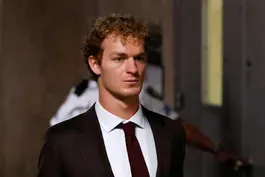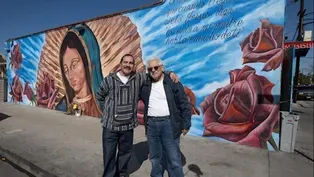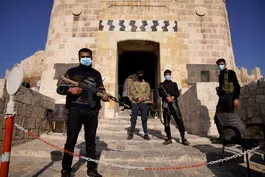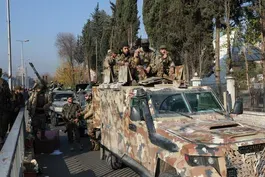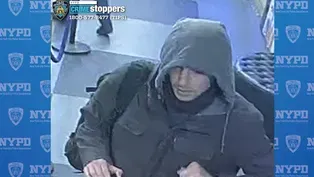
Trump lays out agenda on border, tariffs in interview
Clip: 12/9/2024 | 7m 4sVideo has Closed Captions
Trump lays out agenda on border, tariffs and potential political retribution in interview
Over the weekend, President-elect Donald Trump sat down for his first formal interview since winning a second term in the White House. Trump spoke to Meet the Press about his plans for his new administration, doubling down on campaign promises around mass deportations, threatening political rivals and praising Jan. 6 insurrectionists. Laura Barrón-López reports.
Problems with Closed Captions? Closed Captioning Feedback
Problems with Closed Captions? Closed Captioning Feedback
Major corporate funding for the PBS News Hour is provided by BDO, BNSF, Consumer Cellular, American Cruise Lines, and Raymond James. Funding for the PBS NewsHour Weekend is provided by...

Trump lays out agenda on border, tariffs in interview
Clip: 12/9/2024 | 7m 4sVideo has Closed Captions
Over the weekend, President-elect Donald Trump sat down for his first formal interview since winning a second term in the White House. Trump spoke to Meet the Press about his plans for his new administration, doubling down on campaign promises around mass deportations, threatening political rivals and praising Jan. 6 insurrectionists. Laura Barrón-López reports.
Problems with Closed Captions? Closed Captioning Feedback
How to Watch PBS News Hour
PBS News Hour is available to stream on pbs.org and the free PBS App, available on iPhone, Apple TV, Android TV, Android smartphones, Amazon Fire TV, Amazon Fire Tablet, Roku, Samsung Smart TV, and Vizio.
Providing Support for PBS.org
Learn Moreabout PBS online sponsorshipAMNA NAWAZ: Over the weekend, president-elect Donald Trump sat down for his first formal interview since winning a second term in the White House.
Trump spoke to "Meet the Press" about his plans for his new administration, doubling down on campaign promises around mass deportations, threatening political rivals, and praising January 6 insurrectionists.
Laura Barron-Lopez has been following all this and joins us now.
Good to see you.
LAURA BARRON-LOPEZ: Good to be here.
AMNA NAWAZ: So he has made clear that he plans to implement mass deportations early in his next administration.
What did he say about that and other plans for immigration?
LAURA BARRON-LOPEZ: So, when, it comes to mass deportation, Amna, the president-elect said that he would deport entire families.
DONALD TRUMP, Former President of the United States (R) and Current U.S. President-Elect: I don't want to be breaking up families, so the only way you don't break up the family is you keep them together and you have to send them all back.
KRISTEN WELKER, Moderator, "Meet The Press": Even kids who are here legally?
DONALD TRUMP: Well, what you've got to do if they want to stay with their father?
Look, we have to have rules and regulations.
LAURA BARRON-LOPEZ: According to Pew Research, Amna, that action could impact an estimated 4.4 million U.S.-born children under 18 who live with an unauthorized immigrant parent.
Now, Trump also said that he wants to end the 156-year-old right under the 14th Amendment to birthright citizenship.
KRISTEN WELKER: Can you get around the 14th Amendment with an executive action?
DONALD TRUMP: Well, we're going to have to get it changed.
We'll maybe have to go back to the people.
But we have to end it.
We're the only country that has it.
LAURA BARRON-LOPEZ: Now, it's false, Amna, that the U.S. is the only country that has birthright citizenship.
Some three dozen countries have it as well, including Canada and Mexico.
But how would he do this?
Trump has said during the campaign trail and during statements that he could go around Congress with an executive action, directing agencies to require that at least one parent be a U.S. citizen or a lawful permanent resident for a future child to be able to get automatic citizenship.
He would also direct agencies to stop issuing passports and Social Security to people born in the U.S.
Many constitutional scholars, though, have said that this would require a constitutional amendment through Congress.
And that's the only way this could change.
Of course, if he tries to take an executive action he would face lawsuits, which could then lead to the Supreme Court.
Lastly, Amna, just very quickly, Trump also said that he would allow dreamers, those children who were brought here illegally as minors, to stay in the U.S.
But, during his first term, he tried to eliminate that program, and the Supreme Court stopped him.
AMNA NAWAZ: He's also previously said that he would pardon the January 6 rioters, those who violently stormed the Capitol back in 2021.
What did he say about how quickly he would move on this, and also anything on prosecuting his political rivals, which he's mentioned before?
LAURA BARRON-LOPEZ: The president-elect said that, on day one, he would be looking to pardon these January 6 rioters, saying that he would act quickly, Amna.
And he also accused lawmakers who worked on that House January 6 Committee that investigated the insurrection.
He said that he thinks that they should be thrown in jail, and he accused them of committing crimes.
DONALD TRUMP: And Cheney was behind it.
KRISTEN WELKER: Well... DONALD TRUMP: And so was Bennie Thompson and everybody on that committee.
For what they did... KRISTEN WELKER: Yes.
DONALD TRUMP: ... honestly, they should go to jail.
KRISTEN WELKER: So you think Liz Cheney should go to jail?
DONALD TRUMP: For what they did.
KRISTEN WELKER: Everyone on the committee, you think should go to jail?
DONALD TRUMP: I think everybody on the -- anybody that voted in favor.
KRISTEN WELKER: Are you going to direct your FBI director and your attorney general to send them to jail?
DONALD TRUMP: No, no, no, not at all.
I think that they will have to look at that, but I'm not going to -- I'm going to focus on drill, baby, drill.
LAURA BARRON-LOPEZ: President-elect Trump said that he would leave it up to his attorney general nominee, Pam Bondi, as well as his FBI director nominee, Kash Patel, to ultimately decide if they want to investigate the people that he was talking about there or if they want to investigate President Biden or others.
But those nominees have made clear, Amna, that they want to investigate the investigators and go after anyone they consider an enemy of the president-elect.
AMNA NAWAZ: They covered a lot of topics in this interview.
What else stood out to you?
LAURA BARRON-LOPEZ: The president-elect was asked about medication abortion and whether or not he would restrict it.
At first, he said no.
And then, when pressed on if he would fully commit to not restricting it, he said -- quote -- "Things change."
Also, his comments on tariffs, Amna, he -- talking about the broad tariffs that he wants to implement on goods being imported from other countries, he said that he cannot guarantee that Americans will pay more.
AMNA NAWAZ: Laura, we have talked before, a lot of news organizations have reported on the challenges of interviewing president-elect Trump because of the frequency and the volume of many of the lies he puts forward.
It's well-documented during the campaign season as well.
How did NBC handle it in this interview?
LAURA BARRON-LOPEZ: So, NBC initially put out an edited interview that added some context.
They also released a transcript, and then they ultimately released the entire full, unedited interview.
But during the interview itself, Amna, there was very little to no fact-checking, very little to no pushback in real time as Donald Trump was repeating falsehoods that he made during the campaign trail, as well as outright lies.
AMNA NAWAZ: Well, Laura, while we have you, I want to ask you about things on the transition front with the incoming Trump administration.
His embattled pick for defense secretary, Pete Hegseth, was back on Capitol Hill meeting with senators.
What do we know about that?
LAURA BARRON-LOPEZ: Pete Hegseth met with Republican Senator Joni Ernst of Iowa.
She's a veteran.
She also sits on the Senate Armed Services Committee.
She is a key vote here, Amna.
And she said in a statement today that Hegseth -- that she is going to work with Hegseth during this process and that she believes he should have a -- quote -- "fair hearing based on truth, not anonymous sources," referring there to the sexual assault allegation that Hegseth faced in 2017, as well as the multiple reports that detail intoxication across his jobs.
That is the biggest sign to date, Amna, that Senator Ernst is potentially moving closer to supporting Hegseth.
And that's a welcome sign for Trump's team, because they were really looking to her, hoping that she would back him, because they believe other senators will follow her.
AMNA NAWAZ: There's news on another nomination front.
Today, more than 75 Nobel laureates signed a letter urging senators not to confirm Trump's pick to lead the Department of Health and Human Services.
That is Robert F. Kennedy Jr. What should we know about that letter?
LAURA BARRON-LOPEZ: So, the laureates say that Kennedy has -- quote -- "a lack of credentials" across science, medicine, as well as administration.
And they warn in the letter that Kennedy -- quote -- "would put the public's health in jeopardy and undermine America's global leadership in health sciences."
And they specifically cite his opposition to vaccines, like the measles and polio vaccines.
They also cite the conspiracy theories he's promoted on successful treatment for AIDS and other diseases.
Now, the laureates who signed onto this, Amna, include a cancer researcher, Harold Varmus, Eric Kandel, who is a pioneer in cognitive neuroscience, as well as Carol Greider, a famous molecular biologist.
AMNA NAWAZ: All right, that is our White House correspondent, Laura Barron-Lopez, covering it all.
Thank you so much, Laura.
LAURA BARRON-LOPEZ: Thank you.
Jury acquits man charged after NYC subway chokehold death
Video has Closed Captions
New York jury acquits former Marine charged after subway chokehold death (7m 1s)
LA arts program gives addicts and ex-cons escape to new life
Video has Closed Captions
East LA arts program gives addicts and ex-cons an escape to a new life (6m)
Syria seeks to build government after fall of Assad
Video has Closed Captions
Syria seeks to build functioning government after fall of autocratic Assad dynasty (5m 31s)
What to expect from the Syrian opposition coming to power
Video has Closed Captions
What to expect from the Syrian opposition coming to power after toppling Assad (6m 20s)
What we know about man detained in health care CEO killing
Video has Closed Captions
What we know about the person of interest detained in health care CEO killing (8m 3s)
White House: Future of Syria depends on 'choices they make'
Video has Closed Captions
White House says future of Syrian people depends on 'choices they make' (6m 6s)
Providing Support for PBS.org
Learn Moreabout PBS online sponsorshipSupport for PBS provided by:
Major corporate funding for the PBS News Hour is provided by BDO, BNSF, Consumer Cellular, American Cruise Lines, and Raymond James. Funding for the PBS NewsHour Weekend is provided by...
